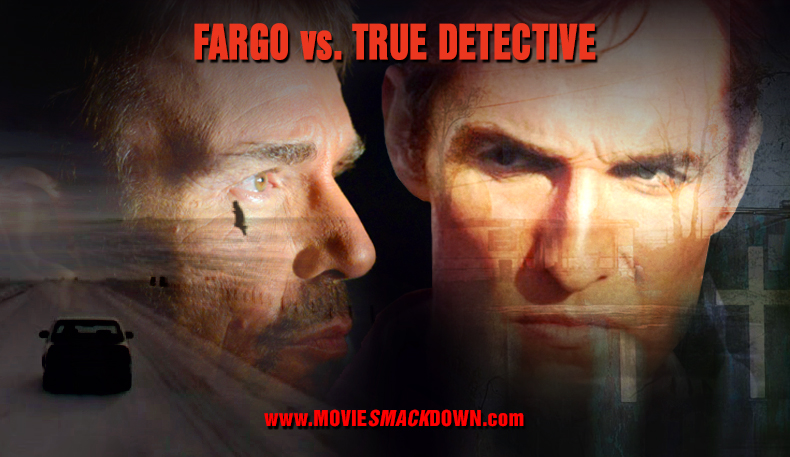
The Smackdown
What will be the water cooler topic of the coming years? If you work in my office, then Fantasy Football is, as always, the obvious answer. (Seriously, people, if it’s such a great sport, why do you need to gin it up with fantasies? But I digress.) In terms of episodic TV, the pickings are growing steadily slimmer, with Breaking Bad a brilliant but fading memory, Mad Men with but a half-season remaining, and Game of Thrones already starting to show its age, with many disappointed by this past season and (quite justifiably) concerned about the coming Hodor-less one.
But the future is not entirely desolate, thanks largely to two formidable contenders introduced this spring. Both were tonally bleak, exceptionally dark and violent, gorgeously filmed, thematically ambitious, refreshingly quirky and dark-humored, and both featured major film stars in the leads. They’re also both, to coin a phrase, “seasonal anthologies,†meaning that each season is a self-enclosed story (which, in my book, really makes them more like a series of mini-series than anything else, but my book remains unpublished, so ignore me). So in their honor, we decided to host a special Must-See-And-Then-Tweet-About TV Smackdown, pitting HBO’s mismatched-cop whodunit, True Detective, against FX’s Minnesota noir, Fargo.
Let the bleakest show win!
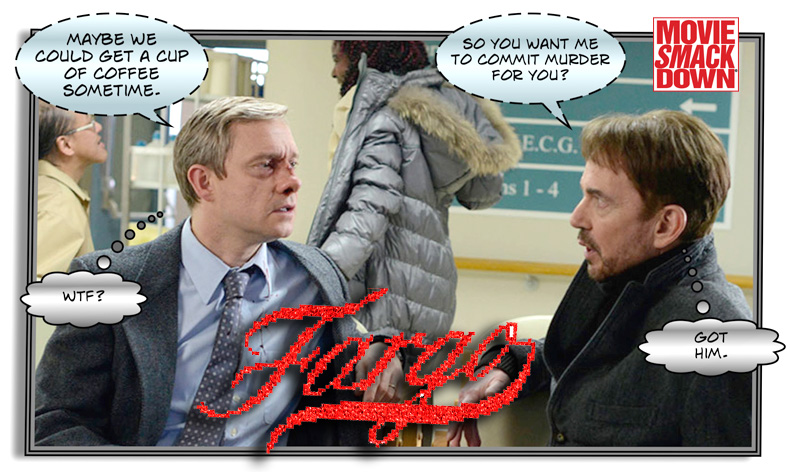 The Challenger
The Challenger
Fargo isn’t exactly a sequel to the modern classic 1996 Coen Bros. film, but it’s not exactly not a sequel either, with at least one very direct (and delightful) plot connection to its predecessor. Mostly it’s a variation on it, featuring characters, story elements and moments of jet-black humor and shocking violence that are reminiscent of it, but still managing to be its own animal, and a quite an unusual one at that. You don’t have to have seen the movie to follow the TV show… but it’s so much more fun if you have. (And really, if you haven’t, what’s wrong with you?)
At the center of the large cast is Lester Nygaard (Hobbit and Sherlock star Martin Freeman, doing a quite credible Minnesota accent), a timid, henpecked insurance salesman who unwittingly kills his harpy wife in a moment of rage. Nygaard then compounds the error by impulsively requesting the aid of a strange out-of-towner he’d recently encountered, Lorne Malvo (Billy Bob Thornton, still brilliant), who clearly is no stranger to violent scenarios. Malvo’s help results in the shooting of the local police chief, but Lester’s friendship with the new chief Bill Oswalt (Bob Odenkirk) shields him from blame for the deaths, even as eagle-eyed detective Molly Solverson (wonderful Allison Tolman, the show’s Marge Gunderson stand-in) focuses her suspicions on him.
Meanwhile, Malvo cheerfully pursues his own ruthless (and frequently prankish) agenda, which involves toying with a wealthy supermarket king (Oliver Platt) and outsmarting two hitmen (Adam Goldberg and Russell Harvard), who have come to town following Malvo’s whimsical murder of the mob-connected town bully (Kevin O’Grady). I should mention here that most of this occurs in the first episode (a recent Emmy winner for Noah Hawley’s script and Adam Bernstein’s direction). Deliberately paced, this show isn’t.
The Defending Champion
Two small-town Louisiana homicide detectives and former partners, Martin Hart (Woody Harrelson) and Rust Cohle (Matthew McConaughey) are being interviewed about a serial case they’d worked on together years before. Who is interviewing them and why, as well as how the intervening years affected them in such drastically different ways (Cohle in particular has become a bedraggled, beer-guzzling train-wreck) are questions this methodically structured series is in no hurry to answer. We simply follow their respective flashbacks and watch a complex, absorbing and inexplicable bond form between the two men as they investigate a series of disturbing, ritualized murders of teen girls.
Hart is the down-to-earth, average-Joe family man with a long-suffering wife (Michelle Monaghan), rebellious teen daughter (Madison Wolfe), and a philandering streak; Cohle is the pensive, philosophical, cynical, enigmatic loner. Naturally, the uneasy pairing makes for a lot of bickering and tension that eventually comes to an explosive head, but their expertise as investigators and determination to solve the case manage to keep them on track. They gradually begin to suspect that the killings are part of a much bigger conspiracy with far-reaching political implications.
The Scorecard
Here we have two highly original, audacious, one-of-a-kind shows that are compulsively watchable for entirely different reasons. True Detective creates an immediate sense of fascination, not merely in terms of the answers to its murder mystery but, thanks to its dueling flashback structure and its occasionally unreliable narrators, how exactly this case affected these two men, their friendship, their careers, and their clearly damaged souls. The plot of nutty Fargo, on the other hand, has no mystery to it per se. Where TD keeps you wondering what the hell happened, your average episode of Fargo leaves you breathlessly asking what the hell is gonna happen next?
Both shows are mainly remarkable for their singular tones, which are better experienced than described. Much of True Detective has a sort of languid, hypnotic, almost other-worldly vibe to it. It may sound on the surface like standard-issue cops-tracking-serial-killer fare, but it simply doesn’t feel like anything else you’ve ever seen. It maintains this creepy, unsettling mood through the entire season, due in no small part to having the same writer and director (Nic Pizzolatto and Cary Fukunaga, respectively) for all eight episodes. Fargo‘s tone, a precarious mix of unnerving suspense, deadpan comedy and sincere tenderness, is slightly more familiar, largely from its cinematic source and from the Coen Brothers’ work in general; Hawley (series creator and writer of all ten episodes) clearly reveres the original, emulating it to just the right degree without merely aping it. (The Coens themselves are not at all involved in the show, but their decision to allow their names to be used with it suggests tacit approval on their parts.)
The two shows also provide some of the most memorable, quotable, stylish TV dialogue this side of Deadwood. Some of Cohle’s ruminative soliloquies on the nature of evil, organized religion, and dreams have already become modern classics, and Fargo provides a nice balance between aping the overly cheerful, ya-heavy cadences first immortalized by the movie and completely fresh voices such as Malvo’s, who demonstrates his capacity for stealing the show quite early on, and never stops surprising.
Both shows benefit from superb, A-list casting. Harrelson delivers his usual solid work here, but he’s essentially a straight man to McConaughey, who with this Emmy-nominated performance (surely a winner, had it not been for Bryan Cranston on the final Breaking Bad season), continues one of the hottest career streaks in recent memory, embodying what is arguably the TV character of the year; whether he’s the contemplative, bizarrely literate and verbose detective of the show’s past or the jittery, rambling wreck of its present, you can’t take your eyes off him. The always-welcome Monaghan provides strong support in an underwritten role (as are many of the female roles in this show — its biggest weakness), and various other terrific character actors (including several Boardwalk Empire veterans) pop up here and there, but it’s mainly McConaughey’s and Harrelson’s platform, and it is their multi-layered friendship and its unlikely endurance that resonates most in the end.
Fargo is more of an ensemble piece, and what an ensemble, garnering no less than four Emmy nominations (again, all falling victim to that Breaking Bad juggernaut), for Tolman, Thornton, Freeman and Colin Hanks as a shy policeman and single dad who gets very tentatively involved with Tolman. The supporting cast is crammed with a wide assortment of familiar faces; in addition to Platt, Odenkirk and Goldberg, the great Keith Carradine shows up as Tolman’s doting dad, and the comedy team of Key and Peele turns up as a pair of bumbling FBI agents, all adding up to one of the most formidable casts on television, and ensuring that the show has nary a dull moment.
Both series boast some bravura, unforgettable moments that will surely come up in Best of 2014 conversations down the line. True Detective’s fourth episode features a raid sequence done in one astonishing, six-minute take (dissected at length here), and the season finale climaxes with a set-piece that is thrillingly tense, visually spectacular and emotionally devastating. Fargo has several masterful set-pieces itself, most notably a rampage done entirely with sound cues, and another wherein the unfortunate target of a Malvo prank is cruelly set up to be the victim of a police siege. It’s a flawless mix of heart-pounding tension and mordant comedy, deftly staged by director Colin Bucksey.
Two terrific shows, though neither without its flaws. It’s certainly a valid argument that the answers True Detective provided ultimately weren’t as satisfying as they felt like they were going to be, and yes, it could indeed have benefited from stronger and more fully realized female characters. And Fargo suffered at times from being a bit over-stuffed with plot threads and characters, and a few twists that were hard to digest, even in the show’s slightly askew universe. But on the whole, both shows are more than worth your time, as ambitious, original and well made as anything else currently on the air.
The Decision
If I had to pick a winner (and I’m being told that I do, dammit), I’d go with the more focused, more audacious, more visionary and more profound True Detective, the entirety of which I am eager to revisit, as I suspect that it amply rewards repeat viewings. But seriously, people, if you haven’t already, set some time aside to binge-watch both of these shows’ respective first seasons, and then set the DVR’s for both next season. And prepare for some long water-cooler sessions.


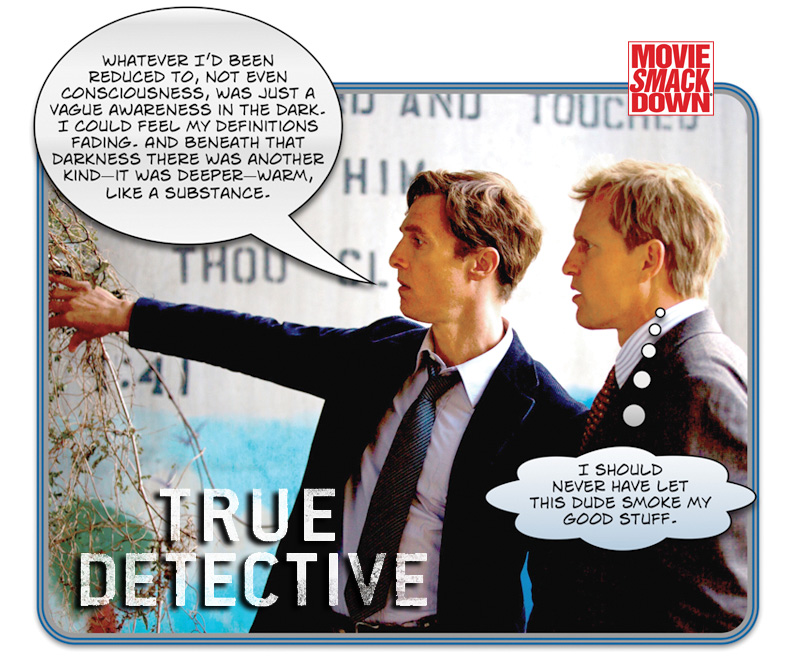
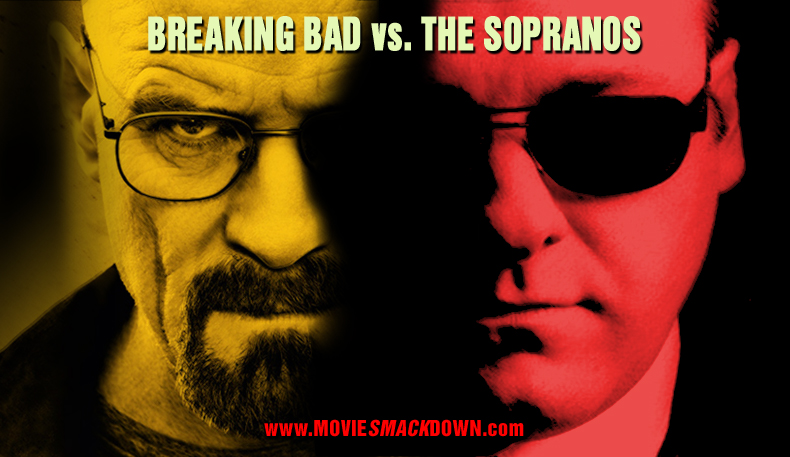
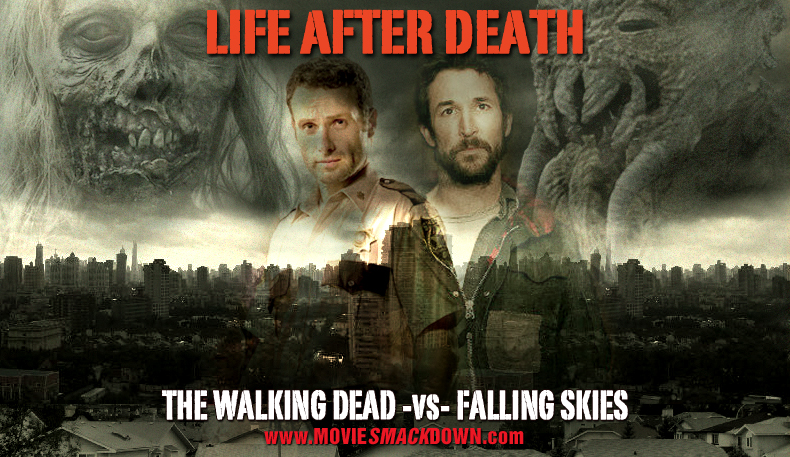
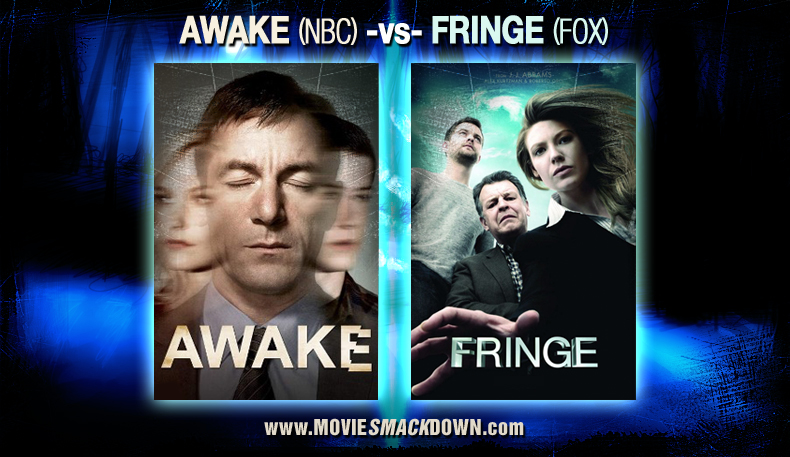
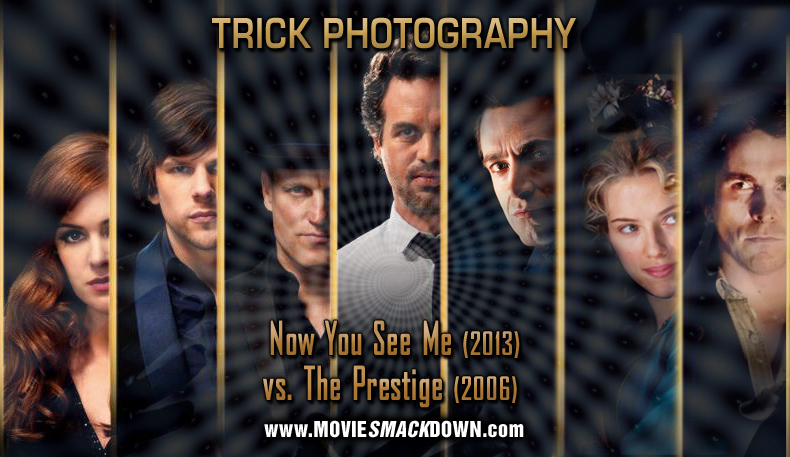
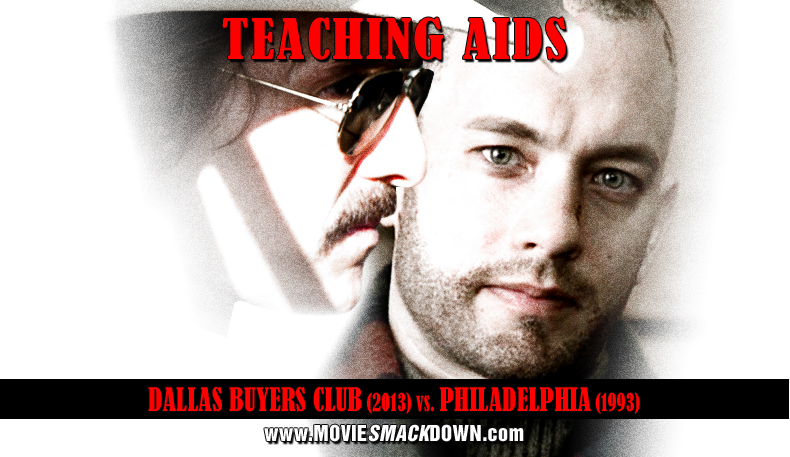
This is so hard. I just voted but it killed me to pull the trigger.